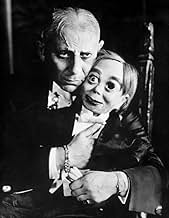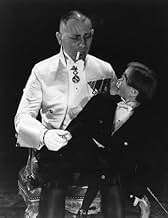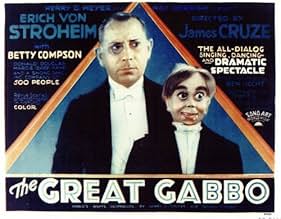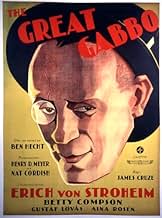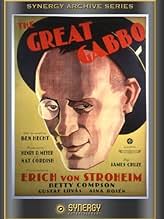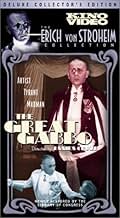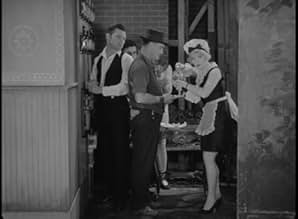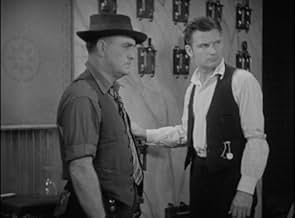CALIFICACIÓN DE IMDb
6.0/10
1.1 k
TU CALIFICACIÓN
Agrega una trama en tu idiomaAn insanely, egocentric ventriloquist, even though he is possessed by his wooden dummy, is in love with a dancer who is in love with another. The dummy gives advice to the ventriloquist.An insanely, egocentric ventriloquist, even though he is possessed by his wooden dummy, is in love with a dancer who is in love with another. The dummy gives advice to the ventriloquist.An insanely, egocentric ventriloquist, even though he is possessed by his wooden dummy, is in love with a dancer who is in love with another. The dummy gives advice to the ventriloquist.
- Dirección
- Guionistas
- Elenco
Erich von Stroheim
- The Great Gabbo
- (as Eric Von Stroheim)
Marjorie Kane
- Babe
- (as Margie 'Babe' Kane)
George Grandee
- Otto
- (voz)
- (sin créditos)
Bo Peep Karlin
- Dancer
- (sin créditos)
Rosina Lawrence
- Dancer
- (sin créditos)
Harry Ross
- Performer
- (sin créditos)
Eddy Waller
- Vaudevillian
- (sin créditos)
Marbeth Wright
- Dancer
- (sin créditos)
- Dirección
- Guionistas
- Todo el elenco y el equipo
- Producción, taquilla y más en IMDbPro
Opiniones destacadas
Though I agree with previous reviewers' comments about the good performances turned in by Erich Von Stroheim and Betty Compson, I thought the movie was disappointing overall. There isn't really much of a story, the dramatic scenes are often slow, and the rather bizarre musical numbers are poorly integrated into the plot. I'm not sure why this movie isn't classified as a musical, though; it has as many numbers as "42nd Street" and other similar titles from about the same period. Unfortunately, as a previous reviewer said, these scenes are not as creatively done as those by Busby Berkeley; the choreography is often unappealing, and the dancers don't look very well-rehearsed, though there are some bright spots.
Interestingly, the contemporary "Variety" review mentioned a color sequence in the film, which was not present on the Video Yesteryear VHS copy I watched. I wonder if this piece is lost, or available on other editions?
Interestingly, the contemporary "Variety" review mentioned a color sequence in the film, which was not present on the Video Yesteryear VHS copy I watched. I wonder if this piece is lost, or available on other editions?
This film about a ventriloquist who lives a self-imposed life of lonliness because of his personality is absorbing, different, and dated. Shortly produced after The Jazz Singer(1927), the film is an early talkie with all the characteristics of an early talkie. It has somewhat stilted stages, little camera movement, and most annoying, a bunch of Busby Berkley type musical numbers that have little to do with the plot. All that notwithstanding, the lead role of Gabbo, a man who lives to be successful no matter what it takes, who is willing to forsake personal happiness to achieve, who runs the scope of emotions in minutes, is played with gusto by that wonderful actor(and even greater director) Erich Von Stroheim. Von Stroheim uses all his European charm(and decadence) as the man who shares life and lives with and through his dummy Otto. There are no supernatural aspects about the relationship with Gabbo and Otto. The movie is in no way a horror picture(although very often advertised as such). It really is a story of the problems a man has exhibiting his emotions, living with others, and living with himself. Some of the scenes are very well-done, including the last shot as we see Gabbo avoid a ladder. The rest of the cast is effective with Betty Compson as a love interest doing a fine job, and Donald Douglas as a lead singer/romantic figure being absolutely absurd. If for no other reason, see the film to see Von Stroheim in action. There was no one like him.
As director and actor Erich Von Stroheim did some very weird films and The Great Gabbo is certainly one of them. In this Von Stroheim is a star attraction in a Ziegfeld Follies type stage review and he is fixated on Betty Compson who used to be his assistant in his act, but walked out on him because he treated her shabbily.
Now she is keeping company with Donald Douglas a young hoofer in the show. He's actually upset as well with her interest in Von Stroheim.
In a way it's hard to review this because just the name of Erich Von Stroheim brings up images of barbaric cruelty show on the screen. The name alone is sufficient to conjure up horrible images.
So Von Stroheim wants to set up house with her and his dummy Otto. As in most ventriloquist stories the dummy functions as an alter ego.
All this with the backdrop of a Ziegfeld type show. That was interesting and like Glorifying The American Girl, The Great Gabbo is a nice filmed record of what these shows were like on stage.
Although Von Stroheim is always interesting, The Great Gabbo's best value is as a record of the type musical revue so popular back then.
Now she is keeping company with Donald Douglas a young hoofer in the show. He's actually upset as well with her interest in Von Stroheim.
In a way it's hard to review this because just the name of Erich Von Stroheim brings up images of barbaric cruelty show on the screen. The name alone is sufficient to conjure up horrible images.
So Von Stroheim wants to set up house with her and his dummy Otto. As in most ventriloquist stories the dummy functions as an alter ego.
All this with the backdrop of a Ziegfeld type show. That was interesting and like Glorifying The American Girl, The Great Gabbo is a nice filmed record of what these shows were like on stage.
Although Von Stroheim is always interesting, The Great Gabbo's best value is as a record of the type musical revue so popular back then.
The Great Gabbo "The Great Gabbo" is one of the finest examples of American Communist Propaganda films of the early 1900's existent today. It is a master piece of film literature, when you consider the limitations of the technology of the day. Vitaphone, the technology used to cut a vinyl record of the speech or music as the action was filmed, was new and very expensive, and made film editing a nightmarish chore if not impossible.
The script employ's Epic Theater techniques taught by Bertolt Brecht. In this respect it is a thinker's film, the film forces you to think. From the very beginning to the end you are constantly quizzical about behavior, motivation and environment. This is a musical comedy, right? How and why is the title card segment at the beginning of film different from other "musicals". Meet the self-absorbed individualist Gabbo who never acknowledges others who help him gain fame, his ventriloquist dummy Otto, and his stage partner Mary.
We soon realize that Gabbo has very superstitious religious beliefs. While he does not perform a sign of the cross, we know that he operates under the fear of his destined fate from unseen mystical powers. For instance when Mary inadvertently places his hat upon the bed, Gabbo calls Mary a foul name saying "Don't you know that it is bad luck?" Mary, in response, lists a series of activities which might displease and bring about the wrath of an angry immortal. She is more practical stating, "We make our own bad luck." The comparative is the communist environment of the musical theater. Everyone works and does their part for the betterment of the show. Here, once Mary leaves Gabbo, she too climbs to the top and find success in her profession as a singer and dancer with her partner/husband Frank. Gabbo and Mary are both successes in their professions, who then is happier? Who is more honest in their success? Capitalism is treated as an impertinent side note to the values being discussed. Capitalism is the financier management of the show and it seeks gain through investing in both ideals.
The film contrasts individualism versus communism. Many reviews have missed the underpinning effort of the writers and directors to use epic theater, and there blatant agenda to use it to teach the values of communism. They often deride the films production numbers as being unpolished and lacking flair. I ask, how could a film made with the intent to teach communistic ideals express them more eloquently? The ideal of community is not a flawless world, but a world where everyone does what they can to contribute to the whole. Some dancers lag behind the others yet they are there doing there part. Some simply walk from one place to another. The stage is full, busy and the message is understood. The imperfect dance numbers, in the epic theater style, emphasize the communistic ideal not detract from it. Few people would dare be as direct today.
The sad thing about communism's failure is that without community all we have left is individualists who, like Gabbo, are only self-absorbed and care nothing for their neighbor, nor acknowledge supportive people.
This film is a treasure that should be studied over and over. There are so many messages you simply can not absorb them in one viewing.
Watch for Otto's "I'm laughing" song sequence, it is a precursor to Bobby McFerrin's "Don't worry, Be Happy." An interesting comparison is with this film's theater community and with the community environment of Los Angeles in the modern movie "Crash." How are they the same? How are they different? How are messages of these two films different? How are they the same? Think about it.
If you don't own a copy of these films you should. I give "The Great Gabbo" two thumbs up and a black and blue stubbed toe. I guess I'm a little like Maryaccident prone. Oh and have a nice day. Be Happy!
The script employ's Epic Theater techniques taught by Bertolt Brecht. In this respect it is a thinker's film, the film forces you to think. From the very beginning to the end you are constantly quizzical about behavior, motivation and environment. This is a musical comedy, right? How and why is the title card segment at the beginning of film different from other "musicals". Meet the self-absorbed individualist Gabbo who never acknowledges others who help him gain fame, his ventriloquist dummy Otto, and his stage partner Mary.
We soon realize that Gabbo has very superstitious religious beliefs. While he does not perform a sign of the cross, we know that he operates under the fear of his destined fate from unseen mystical powers. For instance when Mary inadvertently places his hat upon the bed, Gabbo calls Mary a foul name saying "Don't you know that it is bad luck?" Mary, in response, lists a series of activities which might displease and bring about the wrath of an angry immortal. She is more practical stating, "We make our own bad luck." The comparative is the communist environment of the musical theater. Everyone works and does their part for the betterment of the show. Here, once Mary leaves Gabbo, she too climbs to the top and find success in her profession as a singer and dancer with her partner/husband Frank. Gabbo and Mary are both successes in their professions, who then is happier? Who is more honest in their success? Capitalism is treated as an impertinent side note to the values being discussed. Capitalism is the financier management of the show and it seeks gain through investing in both ideals.
The film contrasts individualism versus communism. Many reviews have missed the underpinning effort of the writers and directors to use epic theater, and there blatant agenda to use it to teach the values of communism. They often deride the films production numbers as being unpolished and lacking flair. I ask, how could a film made with the intent to teach communistic ideals express them more eloquently? The ideal of community is not a flawless world, but a world where everyone does what they can to contribute to the whole. Some dancers lag behind the others yet they are there doing there part. Some simply walk from one place to another. The stage is full, busy and the message is understood. The imperfect dance numbers, in the epic theater style, emphasize the communistic ideal not detract from it. Few people would dare be as direct today.
The sad thing about communism's failure is that without community all we have left is individualists who, like Gabbo, are only self-absorbed and care nothing for their neighbor, nor acknowledge supportive people.
This film is a treasure that should be studied over and over. There are so many messages you simply can not absorb them in one viewing.
Watch for Otto's "I'm laughing" song sequence, it is a precursor to Bobby McFerrin's "Don't worry, Be Happy." An interesting comparison is with this film's theater community and with the community environment of Los Angeles in the modern movie "Crash." How are they the same? How are they different? How are messages of these two films different? How are they the same? Think about it.
If you don't own a copy of these films you should. I give "The Great Gabbo" two thumbs up and a black and blue stubbed toe. I guess I'm a little like Maryaccident prone. Oh and have a nice day. Be Happy!
If there ever was any schizophrenic example of musicals then that would be 'The Great Gabbo'. This is disturbing psychological drama interrupted by lavish and wonderful dance and music numbers. James Cruze is credited as a director but to be honest most of the non-musical scenes have von Stroheim all written over them. And not only because von Stroheim played in them but there is some sort of very specific psychologically tense atmosphere in them. It is unknown to me how much control von Stroheim had over the production but it is clear (to everyone familiar with von Stroheim's work) that he at least gave some instructions.
The film is much more than just a curiosity - two seemingly different movies, a psychological drama, and a musical tied together. Erich von Stroheim brilliantly plays brilliant ventriloquist Gabbo who is mad or driven mad by his art. When we first meet Gabbo on the screen, we see an unpleasant cruel man who in his egocentrism and perfectionism blames everyone else for his failures. After his lover and partner Mary (Betty Compson) drops the tray in the middle of the performance, he accuses her again. She leaves her but not with a light heart. Pass the two years and they both have worked their way up into Broadway. They meet again when they both appear in the same review show.
The dramatic parts concentrating on Gabbo and his relationships with other people are good but quite poorly developed. Probably because of the forceful inclusion of the musical numbers that do nothing to forward the story or even add anything to it. And this is crystal clear while watching the movie. These would have worked in a lesser amount as just a backdrop for the story. Although, I have to say the musical numbers were interesting to watch but that was the wrong movie for them. The dramatic parts are heavy and the sudden transition into the musical numbers puts the viewer off. Although the musical numbers separately are interesting I found them distracting and thus it made it difficult to follow the story.
Although the movie is inconsistent and didn't quite work, it is still worth watching especially for its uniqueness in the musical category.
The film is much more than just a curiosity - two seemingly different movies, a psychological drama, and a musical tied together. Erich von Stroheim brilliantly plays brilliant ventriloquist Gabbo who is mad or driven mad by his art. When we first meet Gabbo on the screen, we see an unpleasant cruel man who in his egocentrism and perfectionism blames everyone else for his failures. After his lover and partner Mary (Betty Compson) drops the tray in the middle of the performance, he accuses her again. She leaves her but not with a light heart. Pass the two years and they both have worked their way up into Broadway. They meet again when they both appear in the same review show.
The dramatic parts concentrating on Gabbo and his relationships with other people are good but quite poorly developed. Probably because of the forceful inclusion of the musical numbers that do nothing to forward the story or even add anything to it. And this is crystal clear while watching the movie. These would have worked in a lesser amount as just a backdrop for the story. Although, I have to say the musical numbers were interesting to watch but that was the wrong movie for them. The dramatic parts are heavy and the sudden transition into the musical numbers puts the viewer off. Although the musical numbers separately are interesting I found them distracting and thus it made it difficult to follow the story.
Although the movie is inconsistent and didn't quite work, it is still worth watching especially for its uniqueness in the musical category.
¿Sabías que…?
- TriviaThe dummy Otto was a hand carved basswood Frank Marshall figure. The same man who designed Edgar Bergen's famous characters Charlie McCarthy and Mortimer Snerd.
- ErroresOverlooking the seeming impossibility of Gabbo having Otto the Dummy speak while Gabbo is eating, smoking, and drinking, Otto's head and mouth move with the words and music when Gabbo is at least six feet away.
- Versiones alternativasThe Great Gabbo (1929) was originally released by Sono Art-World Wide Pictures, with certain sequences were presented in Multicolor. However, current prints, restored by the Library of Congress and released by Kino International on DVD, exist only in black-and-white. Most, perhaps all, VHS and DVD releases of the film have the color sequences in black and white.
- ConexionesEdited into The Girl from Calgary (1932)
- Bandas sonorasEvery Now and Then
(uncredited)
Written by King Zany and Donald McNamee
Performed by Marjorie Kane and Donald Douglas
Selecciones populares
Inicia sesión para calificar y agrega a la lista de videos para obtener recomendaciones personalizadas
Detalles
- Fecha de lanzamiento
- País de origen
- Idiomas
- También se conoce como
- Great Gabbo
- Locaciones de filmación
- Productora
- Ver más créditos de la compañía en IMDbPro
- Tiempo de ejecución
- 1h 32min(92 min)
- Color
Contribuir a esta página
Sugiere una edición o agrega el contenido que falta

